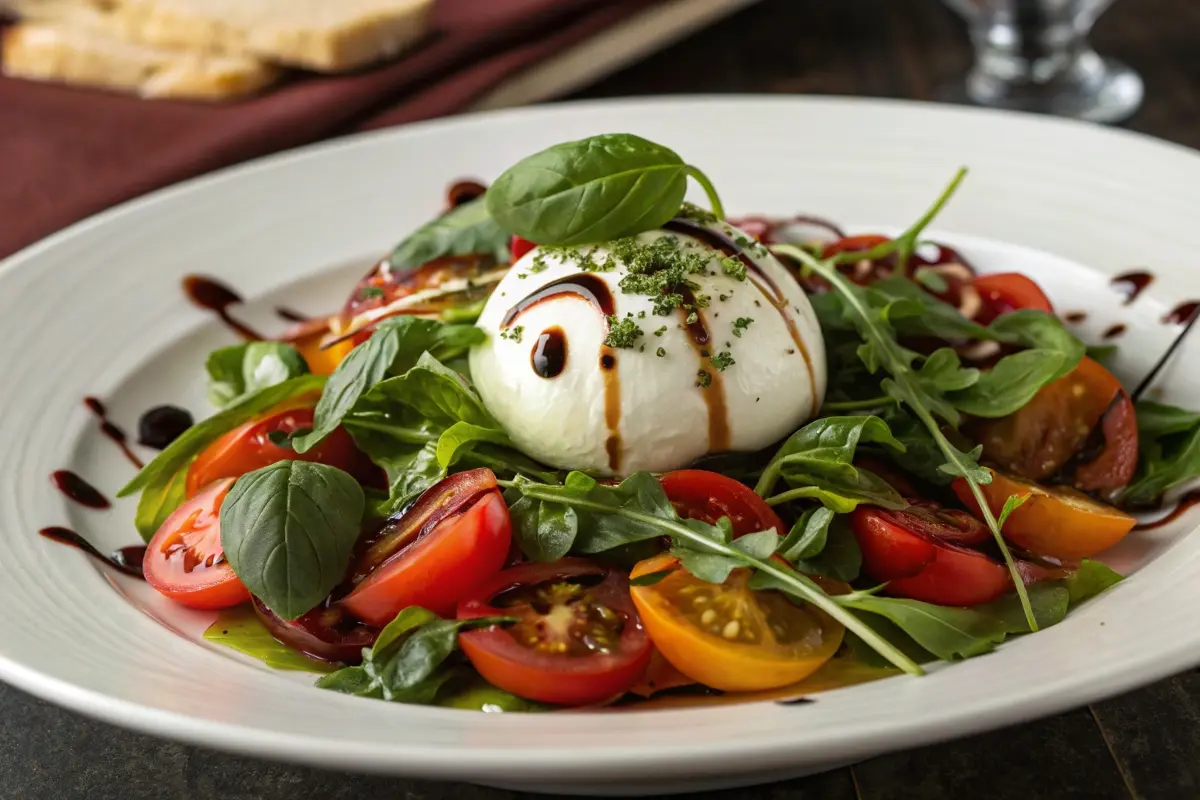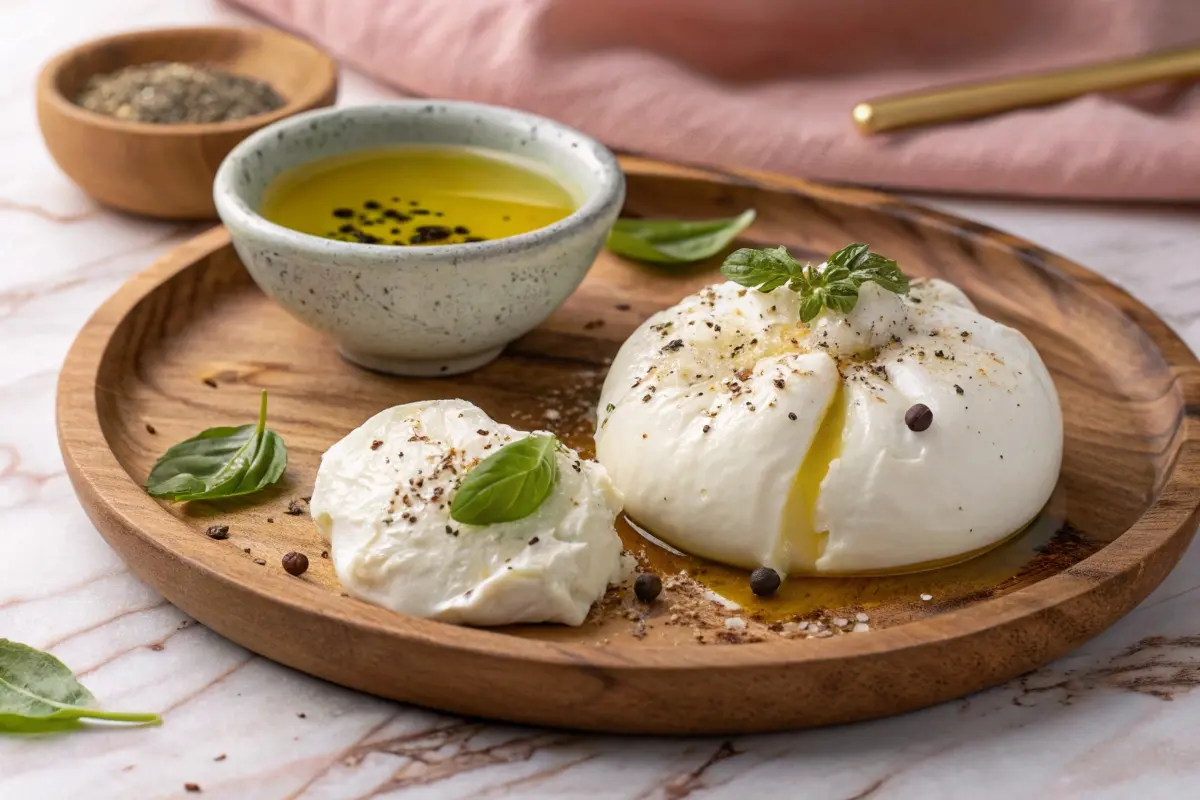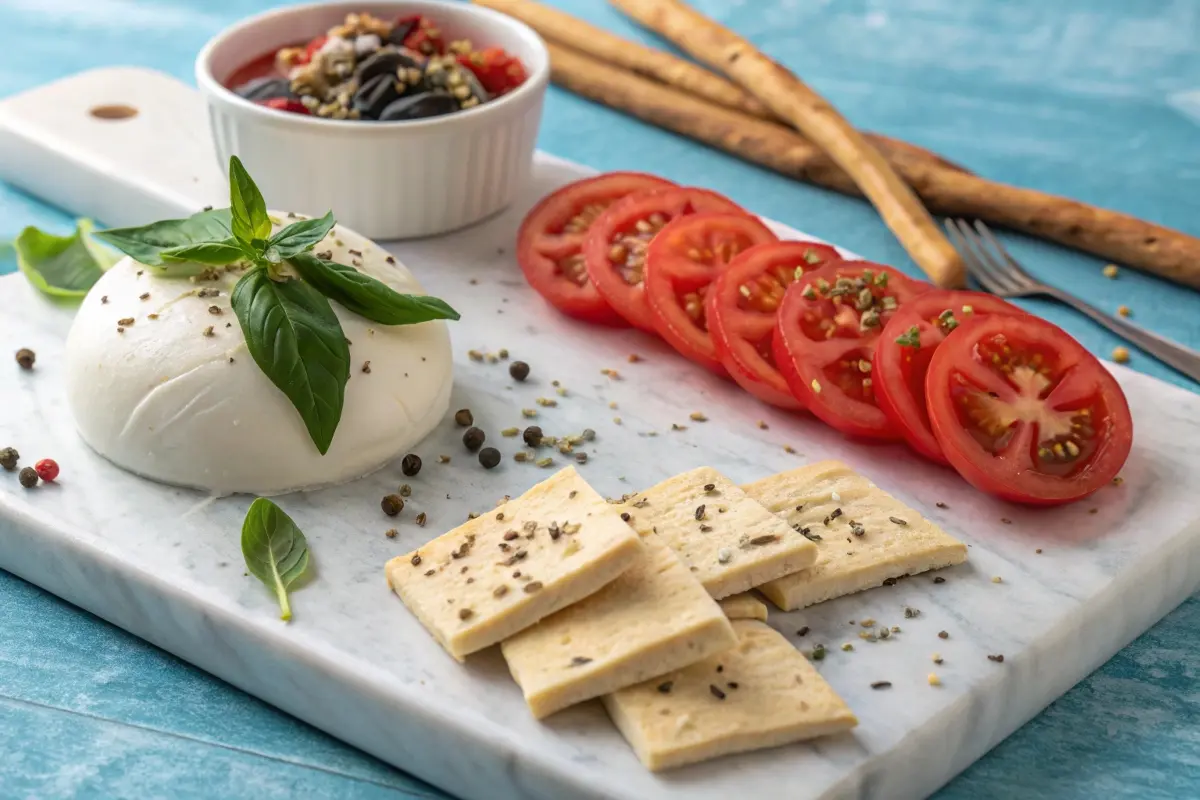Burrata, the creamy and luxurious Italian cheese, has captured the hearts of food lovers around the globe. However, for Muslims and those adhering to halal dietary guidelines, a key question often arises: Is burrata halal? The answer isn’t straightforward, as it depends on the ingredients and preparation methods used to make this delectable cheese. In this comprehensive guide, we’ll dive into the origins of burrata, its production process, and how to determine whether it meets halal standards.

The Origins of Burrata Cheese
Burrata originated in the Puglia region of southern Italy, where it was traditionally created as a way to use excess curds and cream. Over time, this resourceful invention became a celebrated artisanal cheese.
Ingredients in Burrata
The traditional recipe for burrata includes:
- Fresh mozzarella
- Cream
- Salt
- Rennet (an enzyme used to curdle milk)
The inclusion of rennet in the recipe often raises questions about its halal status, particularly for Muslim consumers.
What Does Halal Mean?
Halal is an Arabic term that means “permissible” and refers to what is allowed under Islamic law. For food to be halal, its ingredients and production processes must align with Islamic principles. Specifically, food must not contain:
- Pork or pork by-products
- Alcohol
- Animal-derived ingredients not slaughtered according to Islamic guidelines
The Importance of Halal Certification
For many Muslims, halal certification offers assurance that a product is compliant with Islamic dietary laws. Certified products carry labels issued by trusted organizations, making it easier for consumers to make informed choices.
Common Challenges in Identifying Halal Cheese
Cheese, including burrata, often contains rennet, an enzyme that can be derived from animal, microbial, or plant sources. If the rennet comes from animals not slaughtered according to Islamic principles, the cheese would not be considered halal.
Is Burrata Halal? A Closer Look
Determining whether burrata is halal depends on its ingredients, particularly the source of rennet. Many traditional Italian burrata producers use animal-derived rennet, which may not meet halal requirements.
Does Burrata Contain Animal Rennet?
One of the most crucial factors affecting the halal status of burrata is the use of rennet. Rennet is an enzyme that helps curdle milk during the cheese-making process. Traditional burrata often uses animal-derived rennet, which is obtained from the stomach lining of young calves. This poses a problem for halal-conscious consumers because the permissibility of animal rennet depends on how the animal was slaughtered.
For rennet to be considered halal, it must come from an animal slaughtered according to Islamic guidelines. If the animal was not slaughtered in this manner, the rennet—and by extension, the burrata—would not be halal. Unfortunately, most traditional Italian cheese-makers do not follow halal-specific practices, making it difficult to confirm the compliance of their products.
Alternatives to Animal Rennet
In modern cheese-making, some producers use microbial or plant-based rennet instead of animal-derived rennet. Microbial rennet is derived from fungi or bacteria, while plant-based rennet comes from sources like thistle or fig sap. Both options are considered halal and suitable for vegetarians. Some halal-certified cheese brands exclusively use these alternatives to ensure their products are permissible for Muslim consumers.
However, traditional burrata producers often prioritize artisanal methods over ingredient flexibility. This makes finding halal-certified burrata a challenge unless you specifically seek brands that cater to dietary restrictions.
Enzymes and Additives in Burrata
Beyond rennet, other enzymes and additives used in burrata production can also influence its halal status. For example:
- Enzymes: Some enzymes are added to improve the texture and flavor of burrata. These enzymes may be derived from animal or microbial sources, so their origin must be verified.
- Stabilizers and Preservatives: Additives like stabilizers and preservatives can sometimes include alcohol or other non-halal substances. While these are less common in artisanal burrata, they may be present in mass-produced varieties.
“Reading ingredient labels is crucial when determining the halal status of processed foods, especially for products like burrata that may contain hidden non-halal components.”
How to Identify Halal Burrata
For Muslim consumers, navigating the world of artisanal cheeses like burrata can feel overwhelming. But with a bit of research and diligence, it is possible to find halal-compliant options.
Reading Labels for Halal Assurance
Start by carefully examining the product’s label. Look for key indicators such as:
- Halal Certification Seals: A visible certification from a trusted halal authority, such as JAKIM, Halal Food Authority (HFA), or the Islamic Food and Nutrition Council of America (IFANCA).
- Rennet Source: If the label specifies microbial or plant-based rennet, the cheese is likely halal.
Labels that don’t provide detailed information about rennet or additives may indicate that the product is not halal-certified.
Contacting Manufacturers
If you’re unsure about the ingredients, consider reaching out to the manufacturer. Many companies are willing to provide detailed information about their production processes, including whether their products meet halal requirements.
Choosing Halal-Friendly Brands
Some cheese producers cater specifically to halal consumers by sourcing permissible ingredients and obtaining certification. Brands based in countries with large Muslim populations, such as Turkey or Malaysia, are more likely to offer halal-certified burrata.
Halal Alternatives to Traditional Burrata
If finding halal-certified burrata proves too challenging, there are alternatives to enjoy a similar creamy texture and flavor.
Halal-Certified Cheese Brands
Several brands specialize in producing halal-certified cheeses, including burrata-like options. These brands prioritize using microbial or plant-based rennet and ensure that all other ingredients meet halal standards.
- Safa Halal: Offers a variety of halal-certified cheeses, including mozzarella and ricotta, which can mimic the taste and texture of burrata.
- Organic Valley: While not exclusively halal, some of their cheeses use vegetarian rennet and natural ingredients that may align with halal requirements.
Vegan Burrata as a Halal Option
For those who want to avoid any uncertainty, vegan burrata is a great alternative. Made without any animal-derived ingredients, vegan burrata typically uses plant-based milk, coconut cream, or cashews to replicate the texture and taste of traditional burrata.
Vegan burrata brands are becoming more widely available, or you can try making it at home using simple ingredients.
Homemade Halal Burrata
Making burrata at home gives you complete control over the ingredients, allowing you to ensure its halal compliance. Using microbial or plant-based rennet, fresh milk, and cream, you can create a version of burrata that aligns perfectly with your dietary needs.
“Homemade options not only guarantee halal compliance but also let you experiment with flavors and textures for a truly personalized experience.”
A Simple Recipe for Homemade Halal Burrata
Here’s a quick and easy recipe for making halal burrata at home:
Ingredients:
- 4 liters of fresh halal-certified milk
- 1 cup of heavy cream
- 1/4 tablet of microbial rennet (dissolved in water)
- 2 teaspoons of salt
Preparation Method:
- Heat the milk in a large pot until it reaches 32°C (90°F). Stir gently to prevent scalding.
- Add the dissolved rennet to the milk and stir briefly. Let it sit undisturbed for 10–15 minutes until curds form.
- Once the curds have set, cut them into small cubes using a knife. Gently heat the mixture to 40°C (104°F).
- Drain the whey and mold the curds into a mozzarella ball.
- Flatten the mozzarella ball and fill it with a mixture of cream and shredded mozzarella.
- Seal the edges to form a pouch, and voila! Your homemade burrata is ready to serve.
The Global Popularity of Burrata and Its Halal Adaptations
Burrata’s rise to international fame has been nothing short of extraordinary. Once a regional specialty of Puglia, it is now a beloved addition to menus in high-end restaurants and home kitchens around the globe. Its creamy texture and versatility make it a staple in salads, appetizers, and even dessert recipes. However, as its popularity grows, so does the demand for halal-friendly versions to cater to diverse audiences.
In regions with significant Muslim populations, such as the Middle East and Southeast Asia, chefs and producers have begun experimenting with halal adaptations of burrata. By using microbial rennet and ensuring all other ingredients comply with halal requirements, these producers create a version of burrata that maintains its signature creaminess without compromising religious principles. In addition, vegan burrata made from almond, cashew, or coconut milk has emerged as an inclusive and innovative alternative, allowing everyone to enjoy this Italian delicacy regardless of dietary restrictions.
These adaptations highlight the importance of inclusivity in the culinary world. Food is a universal language, and by offering halal and plant-based options, producers and chefs not only honor tradition but also welcome new audiences to the table. After all, the joy of sharing a delicious dish like burrata should never be limited by dietary concerns.
The Ethical Aspect of Choosing Halal Burrata
Choosing halal burrata goes beyond dietary compliance—it’s also about embracing ethical food practices. Halal guidelines emphasize cleanliness, sustainability, and the humane treatment of animals, values that align with the principles of ethical food production. By choosing halal-certified products, consumers can support producers who prioritize these standards, fostering a more transparent and accountable food industry.
Moreover, the demand for halal products, including burrata, is growing globally. This increased awareness encourages producers to adopt more inclusive practices, benefiting not only halal consumers but also those seeking vegetarian, vegan, or environmentally friendly alternatives. By making informed choices, consumers contribute to a positive shift in the food industry, where inclusivity and sustainability take center stage.
“Food isn’t just fuel—it’s a reflection of our values. Choosing halal burrata ensures that your meals align with your beliefs while supporting ethical practices.”
FAQs About Burrata and Halal Compliance
Is burrata halal?
Burrata’s halal status depends on its ingredients, especially the type of rennet used in its production. If microbial or plant-based rennet is used, burrata can be halal. Always check for halal certification or verify the ingredient sources to ensure compliance.
Is burrata the same as mozzarella?
Not exactly. While burrata and mozzarella share similarities, they are different. Mozzarella is a standalone cheese with a firm texture, while burrata is a filled cheese made with an outer shell of mozzarella and a creamy interior called stracciatella. Burrata is often considered richer and creamier than mozzarella.
Why is burrata so expensive?
Burrata’s higher price is due to its delicate and labor-intensive production process. It is handmade, using fresh ingredients that have a shorter shelf life compared to other cheeses. The combination of craftsmanship and perishability contributes to its premium cost.
Do you eat the skin on burrata?
Yes, absolutely! The “skin” of burrata is made of fresh mozzarella, which is entirely edible. In fact, the contrast between the outer mozzarella layer and the creamy interior is what makes burrata so unique and enjoyable.
Can non-halal burrata become halal if cooked with halal ingredients?
No, if burrata is made with non-halal ingredients, it cannot be rendered halal by pairing it with halal foods. The permissibility depends on the original production process and ingredients.
Is vegan burrata a good alternative?
Yes, vegan burrata is an excellent halal option. Since it is made entirely from plant-based ingredients, it avoids all animal-derived components and is suitable for those following halal dietary rules.
Conclusion: Making Informed Choices About Burrata
The question “Is burrata halal?” ultimately depends on the source of its ingredients and how it is produced. While traditional Italian burrata may not always meet halal standards, alternatives such as halal-certified cheese brands, vegan options, or homemade recipes offer satisfying solutions.
By staying informed, reading labels, and reaching out to trusted manufacturers, you can enjoy the creamy goodness of burrata without compromising your beliefs. Remember, making conscious food choices is not just about adhering to dietary laws—it’s about celebrating your values and enjoying food that aligns with your principles.


